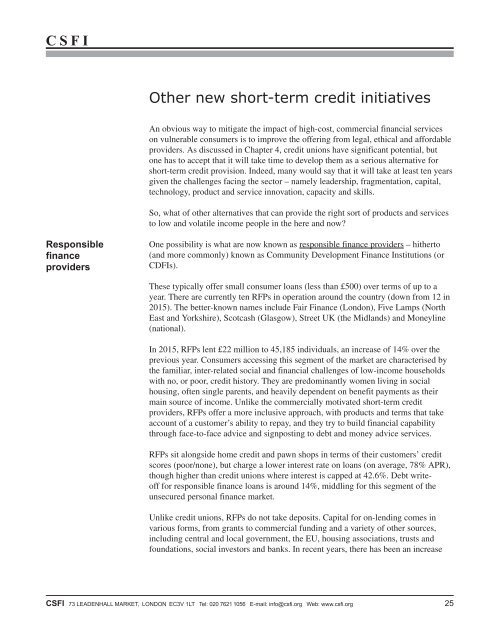CSFI
CSFI+-+Reaching+the+poor+-+release+version
CSFI+-+Reaching+the+poor+-+release+version
You also want an ePaper? Increase the reach of your titles
YUMPU automatically turns print PDFs into web optimized ePapers that Google loves.
<strong>CSFI</strong><br />
Other new short-term credit initiatives<br />
An obvious way to mitigate the impact of high-cost, commercial financial services<br />
on vulnerable consumers is to improve the offering from legal, ethical and affordable<br />
providers. As discussed in Chapter 4, credit unions have significant potential, but<br />
one has to accept that it will take time to develop them as a serious alternative for<br />
short-term credit provision. Indeed, many would say that it will take at least ten years<br />
given the challenges facing the sector – namely leadership, fragmentation, capital,<br />
technology, product and service innovation, capacity and skills.<br />
So, what of other alternatives that can provide the right sort of products and services<br />
to low and volatile income people in the here and now?<br />
Responsible<br />
finance<br />
providers<br />
One possibility is what are now known as responsible finance providers – hitherto<br />
(and more commonly) known as Community Development Finance Institutions (or<br />
CDFIs).<br />
These typically offer small consumer loans (less than £500) over terms of up to a<br />
year. There are currently ten RFPs in operation around the country (down from 12 in<br />
2015). The better-known names include Fair Finance (London), Five Lamps (North<br />
East and Yorkshire), Scotcash (Glasgow), Street UK (the Midlands) and Moneyline<br />
(national).<br />
In 2015, RFPs lent £22 million to 45,185 individuals, an increase of 14% over the<br />
previous year. Consumers accessing this segment of the market are characterised by<br />
the familiar, inter-related social and financial challenges of low-income households<br />
with no, or poor, credit history. They are predominantly women living in social<br />
housing, often single parents, and heavily dependent on benefit payments as their<br />
main source of income. Unlike the commercially motivated short-term credit<br />
providers, RFPs offer a more inclusive approach, with products and terms that take<br />
account of a customer’s ability to repay, and they try to build financial capability<br />
through face-to-face advice and signposting to debt and money advice services.<br />
RFPs sit alongside home credit and pawn shops in terms of their customers’ credit<br />
scores (poor/none), but charge a lower interest rate on loans (on average, 78% APR),<br />
though higher than credit unions where interest is capped at 42.6%. Debt writeoff<br />
for responsible finance loans is around 14%, middling for this segment of the<br />
unsecured personal finance market.<br />
Unlike credit unions, RFPs do not take deposits. Capital for on-lending comes in<br />
various forms, from grants to commercial funding and a variety of other sources,<br />
including central and local government, the EU, housing associations, trusts and<br />
foundations, social investors and banks. In recent years, there has been an increase<br />
<strong>CSFI</strong> 73 LEADENHALL MARKET, LONDON EC3V 1LT Tel: 020 7621 1056 E-mail: info@csfi.org Web: www.csfi.org 25


